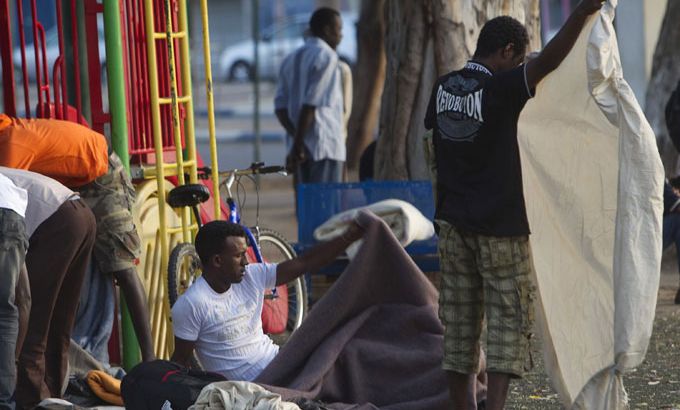
Should Israel be responsible for immigrants?
We discuss why Israel is denying African immigrants their basic rights, as revealed in an annual US human rights report.
The US State Department has criticised Israel’s treatment of thousands of African asylum-seekers who it said are being denied basic social services.
|
“So many Jews not many years ago infiltrated other countries illegally and were saved and were denied and I would expect Israel to remember this. The main problem of Israel is that there is no immigration policy…“ – Gideon Levy, a columnist for Haaretz |
The US’ annual report on human rights issued this week cited statistics from the UN showing the plight of thousands of African immigrants in Israel.
Rights groups said most asylum-seekers have escaped conflicts in Eritrea and Sudan, and entered Israel through Egypt, but no official process is in place to recognise them as refugees.
According to the report, asylum-seekers without refugee status are not allowed to work in Israel and have no access to public social benefits such as healthcare.
The report also mentioned that Israeli government officials often negatively refer to asylum-seekers as “infiltrators” and periodically characterised them as “directly associated with a rise in crime, disease, and terrorism”.
Thousands of Sudanese have migrated through Egypt to Israel – many smuggled in via the Sinai – but entering illegally means they are denied work permits.
The US report revealed that Sudanese and Eritrean asylum-seekers are not allowed access to asylum procedures.
|
“These people are not fleeing directly [from] a war zone. They have come from Eritrea or Sudan into Egypt and in Egypt their lives are not in danger. They are not being persecuted in Egypt and therefore after they have fled to Egypt they have chosen to illegally come to Israel and that makes their situation completely different…“ – Yigal Palmor, an Israeli foreign ministry spokesman |
Instead they are given what is known as “renewable conditional release” documents which defer deportation and have to be renewed every few months.
Citing figures from the UN refugee agency the report said out of more than 4,000 asylum applications this year alone, only one was approved.
The report also showed that more than 6,000 cases are still pending.
According to the Israel Association for Ethiopian Jews, there are about 85,000 Ethiopian Jews in Israel now; and of those about 20,000 were born in Israel.
In addition, Israel has so far integrated about 350,000 non-Jewish immigrants from the former Soviet Union.
So, why is Israel’s handling of the situation being criticised? And with racial tensions and violent attacks against African asylum-seekers on the rise, who is legally responsible for their wellbeing?
Inside Story with presenter Dareen Abughaida discusses these issues with guests: Yigal Palmor, a spokesman for the Israeli foreign ministry; Asaf Weitzen, a legal advisor for asylum-seekers; and Gideon Levy, a columnist for the Israeli newspaper Haaretz.
|
Jewish immigrants from Africa specifically Ethiopia came to Israel in two major movements. The first, called “Operation Moses”, was the covert removal of 8,000 Ethiopian Jews who had fled to Sudan during a famine in 1984. In 1991, a second and larger wave of Ethiopian Jews arrived via “Operation Solomon”. Days after the Ethiopian government fell, a 36-hour airlift carried more than 14,000 Jews to Israel. |